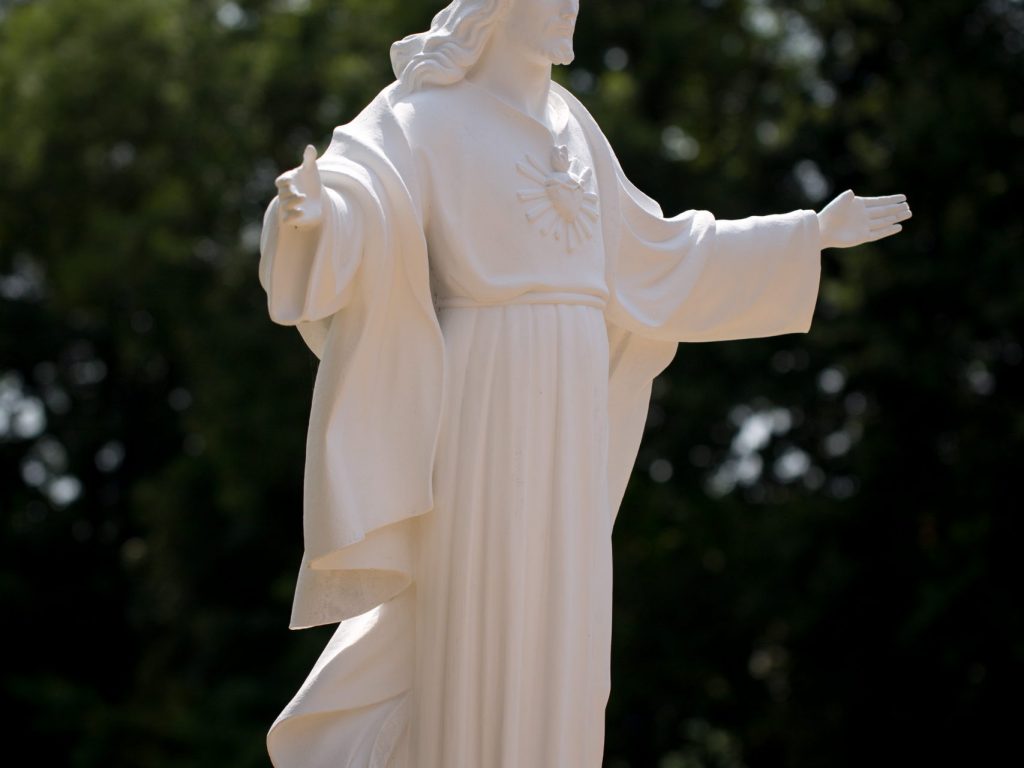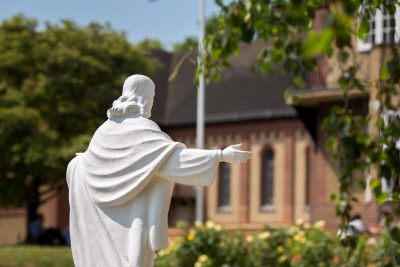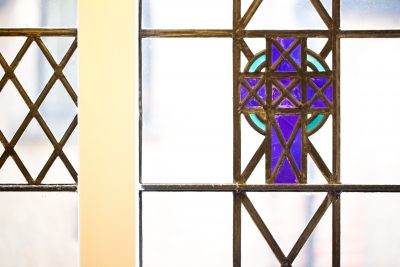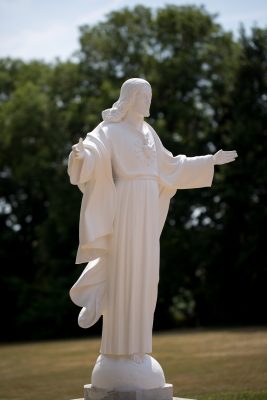Our still, small voice.
‘A clear conscience’, ‘examine your conscience’, ‘a guilty conscience’, ‘prisoner of conscience’, ‘what does your conscience tell you to do?’ We are all familiar with these phrases, our language is full of them. Lower IV have been examining the issue and here are two articles which reflect their work.
Ms Corkery explains, ‘Lower IV have been busy in Religious Education this half term reflecting on the topic ‘Conscience.’ Recently they completed essays displaying their learning from the unit. The standard of essay writing was extremely high, with excellent submissions across the form groups. The two girls whose essays we produce here, Natania and Niamh, produced fantastic essays, which are well worth reading. They display a confident grasp of the topic and include excellent insights into erroneous judgement and how to educate one’s conscience, as well as give positive example of amazing people who have followed their conscience at a great risk to their lives – Oscar Romero and Irena Sendler.’
Firstly we hear from Natania:
‘Conscience can be a difficult thing to understand. It is actually quite simple. Many people do not even know what it means. The Church teaches us that conscience is a gift from God, and is the voice of God in the heart and soul of a person, leading us in the correct direction. It is a person’s sense of right and wrong, especially in relation to their own actions and motives. Christians believe that they are born with their conscience, and should not ignore it, and always try to do the morally right thing, even if it means standing up for what you believe in and going against the crowds.
“In the conscience, God speaks to man.” (Youcat 295).
Moreover, in the depths of our being, each person detects laws which has not come from ourselves, but which we must obey and understand. This law urges us to do good, and avoid evil. We need to be careful not to deceive ourselves, it is more than just a feeling or a hunch, and the Church states that to obey it is the highest point of honour, and we will be judged by it. Our conscience is not a matter of personal preference or opinion; it does not allow us to justify doing whatever we want. It does not invent what is right or wrong- it is not our conscience that makes the laws for us to follow. It speaks the still, strong, honest, and sometimes even the uncomfortable truth- “Conscience is that still, small voice that is sometimes too loud for comfort.” – Bert Murray.
Your conscience can also make you feel guilty from time to time (a ‘guilty conscience’ is regret associated with knowing you did wrong).
The Church teaches us that the formation or education of conscience is a lifelong task. We need to inform our conscience before making any decisions, and learn how to make the correct choice. It can be educated in various different ways. Some ways are:
- Praying for guidance.
- Reflecting on the issue in the light of the teachings of Jesus.
- Finding out what the Catholic Church teaches about it.
- Wait until we know what God’s will for us.
There are many figures who have listened to their conscience and did the right thing, however, two of the most famous people who did this are Oscar Romero and Irena Sendler.
Firstly, Oscar Romero. He is known by many people as the ‘Conscience of El Salvador.’ He was the voice of the people, and wanted justice for the poor and oppressed (people living in poverty with no one to speak out for them). Even though he went against the government, and spoke out against them, and feared for his life, he never stopped doing the morally right thing. He was courageous, compassionate and very devoted (faithful). What he did, standing up to the government, and going against the authorities, was dangerous and not easy to do- he needed to be strong, and brave to have the courage to speak out, and also to live stream illegally from a radio station, and share the truth with the community. Moreover, he helped people until the day he died; he never stopped doing the morally right thing, and always listened to his conscience. Oscar Romero believed that no one is forced to fulfil an immoral command or rule. He spoke out and was the voice of the people – he defended the poor and spoke the truth. By always listening to his conscience, he has inspired others to do the same, and follow his example (he always wanted justice for the people). Oscar Romero was going to be there for the people of El Salvador, guiding them in the right direction even after his death. He said, “I do not believe in death without resurrection. If they kill me I will rise again in the people of El Salvador.”
Secondly, there was Irena Sendler. She worked as a Polish Catholic nurse during World War II. She saved 2,500 children from death, as she tried to take as many of them in as she could to save them from going to concentration camps. She transported them in ambulances, and hid them in trash cans, graves and so on. Even though it was dangerous and it could get her killed, she used her position and did everything she did to save the Jewish children. Sendler said, “I was taught that if you see a person drowning, you must jump into the water to save them, whether you can swim or not.”
Additionally, she kept a record of the children and their names, families, homes, and where she sent them (for example, convents and Catholic families), so that after the war had ended, she could bring them back to their families. At the end of the war, she tried to get the children back to their families, and never stopped helping them, and if she could not, she sent them to safe homes, orphanages and Palestine. She never betrayed her mission to God, even though she came close to death many times (regardless of her own safety, she always did the morally right thing). Irena Sendler went against the political authorities like Oscar Romero did, and was brave and courageous, and a very important figure in history – even if some people thought things were impossible and dangerous, she managed to do them, and at the end of the war, she was given a title of ‘Righteous among the Gentiles.’
Conscience is a very important thing that we need to learn about and educate. We must always do the correct thing, and learn from the example of Oscar Romero and Irena Sendler, meaning that you must always do the morally right thing by listening to your conscience, even if you are going against the crowds – you must stand up for your beliefs and listen to God, and not ignore Him or go against Him or try to shut out your conscience. You do not have to risk your lives, which is what Oscar Romero and Irena Sendler did, but try to do little things, to help the community and people around you.’
Next, we have a report from Niamh, also in Lower IV:
‘The dictionary definition for conscience is ‘the moral sense of right and wrong’, but it is more than that. It is God’s voice inside our head guiding us and reminding us of what is truthfully and morally the correct thing to do and bringing us away from what is wrong. God helps us make difficult decisions by guiding us down the right path and making sure that we do not do what is wrong. It tells us what the right thing to do is when we may be uncertain about it, and it stops us from doing the wrong thing and maybe even breaking one of the Ten Commandments or the Law.
We are not just born with a fully formed conscience, we have to inform and educate it in what is right and wrong, and we learn this from listening to other people, including family, friends, priests and bishops. We also learn this from reading the Bible and the Church’s teachings on matters relating to conscience. All of us have educated our conscience differently and have different views on what is right and wrong. Some people would act differently in certain situations as they have informed their consciences in different ways. Therefore, there could be arguments on what is actually right and wrong as many people may all have different points of view on the matter. Mostly, people have similar views though they may vary slightly depending on the exact situation that a person is faced with. If your conscience is not educated correctly or not at all then you are more likely to make the wrong moral decision. Your conscience does not tell you the answer to a maths problem, but it informs you of what to do when you are in an ethical dilemma. Erroneous judgment is when our judgement is wrong or incorrect as we have not informed our conscience correctly or that we refuse to believe in other people’s teachings and only believe what we want to believe. This is relativism which teaches us that we can make up our own truth. But this may also keep us from believing in the truth and making up what we think is the truth.
St Augustine said, ‘If you believe what you like and reject what you don’t like, it is not the Gospel that you believe in but yourself.’ When he said this, he meant that if we make up our own truths, then we will go against the Gospel and God’s teachings. St Augustine is saying how if we follow relativism then we might go against what is true. For example, if someone believes that killing is morally correct, then they would go against the Ten Commandments, in this instance, ‘Thou shalt not kill’. Therefore, this person’s judgment is erroneous. We have to inform our conscience from lots of different sources and not just make up our mind without consulting someone else before we make a moral decision.
It is not just Catholics or people of other religions who have a conscience; everyone does, and they still need to educate and follow their conscience to guide them on what is right and wrong. This quotation from St Paul is helpful in understanding how everyone has access to natural law to inform their conscience: ‘When Gentiles, who do not possess the law, do instinctively what the law requires, these, though not having the law, are a law to themselves. They show that what the law requires is written on their hearts, to which their own conscience also bears witness; and their conflicting thoughts will accuse or perhaps excuse them.’ This shows how all of us have a conscience and we all have set things that are morally right and morally wrong. This is why so many countries have similar laws such as: no stealing, no killing, etc. Even though people don’t always believe in God, we all know what is right and wrong and that we all know what we should and shouldn’t do regarding moral laws.
An example of someone who followed their conscience was St Oscar Romero. Romero became the conscience of El Salvador and tried to teach the people (especially the military) what was right and wrong through the teachings of the Church and of God. He tells them how they should act, and he informs them of what they should and shouldn’t do when they can’t think of the answer for themselves. He also followed his own conscience by standing up for the poor people of El Salvador even though he knew of the threat that doing this would cause to his life. He spoke out about the mistreatment of the poor and how they were being exploited by the rich and powerful. Romero broadcasted his homilies and tried to inform everyones’ conscience when they couldn’t see the truth for themselves. Eventually, he died following his conscience but, deep down he knew that it was the right thing to do for the benefit of the people of El Salvador.
Another person who followed their conscience was Irena Sendler. Irena was a Polish nurse during the Nazi occupation in Warsaw. She became known as ‘The angel of the Warsaw ghetto’ because she saved over 2,000 Jewish children from dying at the hands of the Nazis. She knew that what the Nazis were doing was morally wrong, so she rescued Jewish children from concentration camps and hid them, giving them new names. She kept the children’s original names so that they could be reunited with their parents once the war ended. She was arrested and tortured by the Gestapo for information about where the Jewish children were and the Polish resistance that was going against the Nazi regime that Irena was a part of. She still followed her conscience and did not give up any information. She was sentenced to death but was rescued by a soldier from the Polish resistance. She followed her conscience and helped people in need even though she knew that there was great danger in doing so and didn’t stop following her conscience even when she was sentenced to death and being tortured.’
Categories: Faith Life Senior Whole School





